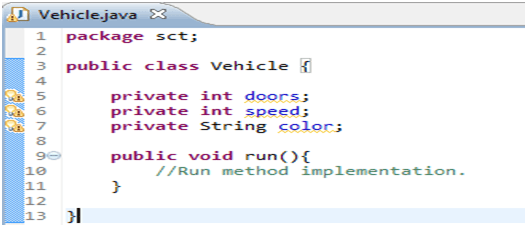
But with the reflect, it is absolutely possible. While the bloody mess we see when a tiger catches its prey suggests no hint of compassion, humans can consciously deny our will and seek to reduce the Sisyphean suffering of the world, writes Robert Wicks. In this example, we will try to access the private field defined in the other class. You can not access the method or field when it is private in the usual way, java compiler does not allow that. The perpetual battle between predator and prey in nature is a display of a gruesome will, a will-to-live at the ground of all things. Modifier prohibiting value modification: final. Modifier restricting to one instance: static. Field-specific modifiers governing runtime behavior: transient and volatile. Reflection treats properties as hide-by-name-and-signature. The common type system rule is that the inheritance is the same as that of the methods that implement the property. We can access private fields and methods outside of class using reflection. There are several modifiers that may be part of a field declaration: Access modifiers: public, protected, and private. A method (both virtual and non-virtual) can be hide-by-name or hide-by-name-and-signature.
JAVA REFLECTION GET PRIVATE FIELD VALUE CODE
With dp4j it is possible to test private members without directly using the Reflection API but simply accessing them as if they were accessible from the testing method dp4j injects the needed Reflection code at compile-time. There are also cases when you can greatly simplify a test case by using reflection to test all smaller private methods (and their various branches), then test the main function. There's a long-standing debate on whether testing private members is a good habit There are cases where you want to make sure a class exhibited the right behavior while not making the fields that need checking to assert that public (as it's generally considered bad practice to create accessors to a class just for the sake of a unit test). When the value of a private field is always assigned to in a class methods before being read, then it is not being used to.
JAVA REFLECTION GET PRIVATE FIELD VALUE HOW TO
Now you know how to test a private method using Reflection in JUnit. Java Reflection API Where it is used class Commonly used methods of Class class: How to get the object of Class class 1) forName() method. It can change the value of a private field of an object. You have the field, but you don't have an instance of the object. To set the entire array at once, use .set(Object obj, Object value). Note that get method is often confusing for people. Just as in non-reflective code, an array field may be set or retrieved in its entirety or component by component. String value (String) f.get(object) Then you use the field object to get the value on an instance of the class. setAccessible(true) // get the value of this private field String. Field f ('str') f.setAccessible(true) //Very important, this allows the setting to work. JUnit's are unit test cases, used to test the Java programs. It can get a list of fields in a class and investigate their properties. With reflections, we can get the information about any classs structure like its. Using Java Reflection, it is possible to set and get the. We need to add some explanation of what is going on here. Java Reflection provides some methods to examine the Class fields and change their values at runtime.

Import import import public class Hacker Ĭonsole for Code listing 10.4 Access all the methods With Java reflection, we can inspect constructors of any class and even create class objects at runtime.


 0 kommentar(er)
0 kommentar(er)
